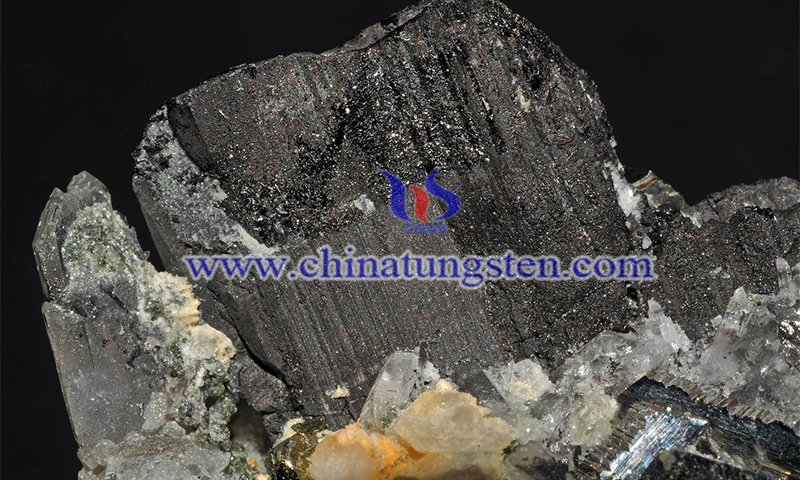Saudi Arabia, Nigeria, Kyrgystan Seek Investors to Develop Minerals Including Tungsten, Molybdenum
- Details
- Category: Tungsten's News
- Published on Friday, 10 December 2021 16:50
Government representatives from Saudi Arabia, Nigeria, and Kyrgyzstan told a mining and finance conference in London this week that they are seeking new investors to develop their mining GDP, including tungsten, molybdenum, and other mining industries. Both Saudi Arabia and Nigeria aim to use the mining sector to reduce their economic dependence on oil, they said, with plans for an auction program for mineral deposits in the near future and, in the case of Nigeria, next year.
The countries say the development of these resources could help overcome a supply gap in the coming years for energy transition materials, including lithium, copper, cobalt, and rare earth elements, for which demand is rising rapidly, for electric vehicle batteries and engines and wind turbines.
Khalid bin Saleh Al-Mudaifer, deputy minister for mining affairs at Saudi Arabia's Ministry of Industry and Mineral Resources, told delegates at the conference, "There is a significant risk of supply shortfalls in the future. With the emergence of a potential super-cycle for some mineral commodities, maintaining the supply chain is critical."
Saudi Arabia's Al-Mudaifer said the kingdom's mineral wealth is 'largely underexplored,' but $50 million in private and public sector investments over the past decade, including the development of phosphate and bauxite, have enabled the country to become a global player in these areas.
Saudi Arabia also has reserves of copper, silver, tantalum, tin, niobium, zinc, uranium, iron ore, and other resources. Overall, 130 exploration licenses and eight new mining licenses have recently been issued.

"Mining will be a third pillar of the Saudi economy after oil & gas and petrochemicals and we have now launched a mining strategy with more than 37 initiatives," the vice minister said, noting the country is "on track" with its Vision 2030 social and economic development strategy, launched in 2016. "We want to reduce our mineral imports by 65%," he said, noting that the kingdom currently imports a number of minerals. The kingdom, a major oil producer, aims to derive 50% of its energy from renewables by 2030 and is building a 3 million mt green hydrogen plant, he said.
"Mining will become the third pillar of the Saudi economy after oil and gas and petrochemicals, and we have now launched a mining strategy with more than 37 initiatives," the deputy minister said, noting that the country is 'on track' to implement the Vision 2030 social and economic development strategy, which was launched in 2016. "We want to reduce our mineral imports by 65 percent, and as a major oil producer, we aim to get 50 percent of our energy from renewable sources by 2030 and are building a 3 million ton green hydrogen plant," he said.
Al-Mudaifer said the Kingdom will hold the Future Minerals Summit in Riyadh on January 11-13, 2022, to discuss investment opportunities.
Abdulrazaq Garba, director general of Nigeria's Ministry of Mines and Steel Development, noted that 17 new ore bodies, rich in iron ore, hard rock lithium, tin, lead, zinc, copper and gold, have recently been discovered in the West African country.
Olamilekan Adegbite, Minister of Mines and Steel Development, told delegates: "Mining in Nigeria is still very new and we are new in this field. He said some of Nigeria's minerals are found very close to the surface, which means production costs can be very low, for example gold can be produced for as little as $600 per ounce. We are also encouraging processors to come to Nigeria."
There are many projects in the exploration phase in Nigeria and government spending in this area is limited," Shinkafi said. The SMDF was established to invest $500 million in the mining sector, which is expected to unlock $1 billion in third-party investment and financing. In a speech, she said she hoped that within five years mining revenues would grow tenfold and account for 3 percent of the wealth of the Nigerian economy."
Kyrgyzstan is seeking investors for various mining projects containing copper, gold, vanadium, rare earth elements, tantalum, niobium, tungsten, molybdenum, iron ore and more, said Tengiz Bolturuk, chief executive officer of the country's state holding company. He said the country has a new mining law based on Canadian mining laws and best international practices.
Chinese investors are interested in the Djetym magnetite 32-36% iron ore project, which is located about 150 km from the Chinese border," Bolturuk said. Drilling is expected to begin at the Andash copper-gold mine, while the Kutxai rare earth mine is in the pre-feasibility stage and the Taldybulak molybdenum-copper-gold project has copper reserves of 26,438 tonnes and was previously drilled in the 1980s and 1990s."
We want to open up to Western investors," Bolturuk said. He said the country is also seeking investors in logistics, including water supply and the Internet, and has more than 200 small hydropower projects."
- Tungsten Manufacturer & Supplier, Chinatungsten Online: www.chinatungsten.com
- Tungsten News & Prices of China Tungsten Industry Association: www.ctia.com.cn
- Molybdenum News & Price: news.molybdenum.com.cn
- Tel.: 86 592 5129696; Fax: 86 592 5129797; Email: sales@chinatungsten.com



 sales@chinatungsten.com
sales@chinatungsten.com